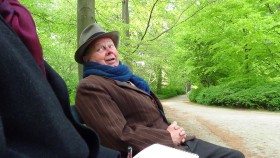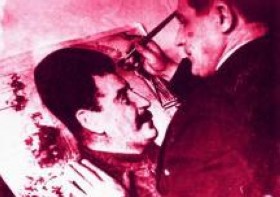Det drejer sig om et stort anlagt og imponerende biografisk filmessay om skuespilleren, forfatteren, maleren og tegneren Robert Storm Pedersen (1882-1949) og hans kunst. Kunstnerbiografien er en af Jørgen Vestergaards foretrukne genrer, der har været film om malerne Ovartaci, Jens Søndergaard og Kirsten Kjær, musikerne Evald Thomsen og Karl Skaarup, billedhuggeren og præsten Anton Laier. Ærlige, på en smuk måde troskyldige, hver for sig af særlige grunde vidunderlige film.
Storm Petersen skildringen, som nu et stykke tid har kunnet ses i en række biografer slutter sig til rækken. Den er et indforstået arbejde, en skildring af et næsten privat forhold, som medfører en indforstået fortrolighed, som faktisk er venligt så ekskluderende, som når jeg udsættes for fremmede menneskers familiebilleder eller fotos fra rejsen. Jeg kigger fra yderst på stolen høfligt interesseret på Jørgen Vestergaards verden. Og nej, ikke engageret. Og hvad skyldes så det? Nok, tror jeg, at jeg ikke er fortrolig med det gamle København, BT, Peter og Ping i gamle dage, kender ikke Pilestræde og Berlingske, borgerskabets smag og humor. Det har aldrig været en del af min verden.
Fortællerstemmen er (måske kun for mig?) lidt krukket og påpegende, noget nedladende, men nok ægte inden for den etablerede Storm Petersen tradition og for det trofaste publikum fortsat udholdelig. Men den er overtydelig, faktisk ikke i øjenhøjde. Mon med nogen overhovedet? Det mærkelige er, at den taler midt ind i det moderne, om det moderne. Og så kommer Ebbe Rodes sangforeningsformand! Han er moderne og er i min begrænsede erindring helt sin egen tradition, uopslidelig, moderne kunst i kontakt med verdenskunsten, både med Mark Twain og Samuel Beckett tror jeg. Og Storm Petersens egen oplæsning i radioen er vidunderligt moderne, ægte og aldeles udholdelig og holdbar. Og så kommer filmens højdepunkter, dens umistelige tilføjelser til Storm Petersen fortolkningen:
To højdepunkter, Nikolaj Kopernikus’ Dada-rekonstruktion af monologen ”Aakirkeby” og Jesper Asholts absurdistisk insisterende mand på parkbænken. Det er perler af nutidighed, neomoderne (hvis der var noget der hed det), store monologer, støvfri af al hengemt veneration, men resolut understreget af scenernes stiliseringer i setdesign, instruktion af statisterne og af Steen Møller Rasmussens præcise fotografering, som tindrende morsomt tager sig selv så alvorligt, at vidste jeg ikke bedre, ville jeg tro, jeg var til dilettant i vores forsamlingshus.


De to scener bringer forfatteren Robert Storm Petersen fortolkningen ud af konventionerne, nøjagtig som filminstruktøren Jørgen Vestergaard gjorde det med sin dukkeanimation fra 2001 af en række af Storm Petersens såkaldte opfindelser. Den geniale lille film, ”Storm P. ’s opfindelser” følger som en helt logisk bonus på dvd-udgaven.
Jeg tror, jeg er uenig med Jørgen Vestergaard og Bo Hr. Hansen i opfattelsen af Robert Storm Petersen, men det er dem, som har undersøgt sagerne, læst bøgene, set billederne, gennemgået arkivet, jeg har selv kun en fornemmelse. Den får mig imidlertid til at tænke, at jeg ville tage ham helt ud af afdelingen for spøg og skæmt, som jeg fornemmer, at Ebbe Rode gjorde, som jeg oplever Kopernikus og Asholt og Jørgen Vestergaard gør i de får scener, og det kan jeg selvfølgelig ikke, men nogen skulle gøre det engang. Og i Storm Petersens sprog ville man måske finde en grundlæggende dansk absurdisme modsvarende den franske. Det bliver en anden gang. Nu er det sådan, at Jørgen Vestergaard har leveret en stor og solid og smuk Robert Storm Petersen filmbiografi på en stolt folkelig traditions sikre grund. Et værk, som vil blive stående og føje sig passende ind i instruktørens samlede værker, som ikke er døgnfluer, men som bliver stående på hylden for at tages ned for gensyn på gensyn.
Danmark 2015, 55 min. With English subtitles.





